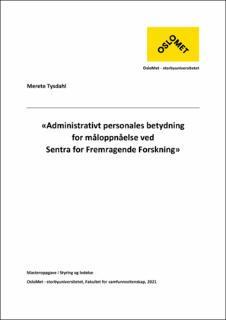| dc.description.abstract | Centre of Excellence (CoE) is a politically initiated financing scheme from the Research Council in Norway aiming for long term, high quality and innovative research, contributing towards solving the big challenges of our society. Two evaluations conclude that this scheme is a success. These evaluations does not however pay much attention to the role of the administration in that regard. This master-thesis investigate how administrative leaders in the CoE contribute towards goal achievement. This has not previously been studied.
For the data collection individual interviews was chosen, because they provide an open and investigative approach, well suited to gather relevant information. The analysis are based on organizational theory for public organizations, theories about organization types and previous research regarding the role of administrative personnel in research and higher education.
The administrative leaders in CoE work in the interface between academic work and administration. My research shows that most of them have an academic background. They are highly educated, on master or PhD level, and some have research experience beyond that. Most of them have relevant work experience with a good overview of how the research and university systems work. The administrative leaders can further be recognised by their ability to create a good work environment and their social integration skills. This is very important in CoE, not the least because the centres depends heavily on recruitment of international research staff. In this regard good language skills and intercultural competence are also important.
These leaders contribute to goal achievement through relieving the researchers and facilitating research related tasks, like conferences and meeting places, and haveing a good overview and ensure internal and external information flow. They also organize social activities and function as a central hub or connector.
The administrative leader role demands a mix of knowledge and competencies, resembling the role of the classic middle range leader in the professional bureaucracy of today. With a great variety of different assignments coupled with being a connector for tasks and functions, both vertical and horizontal in the organization. In addition the administrative leader in a CoE also works close with the research leaders and the research activities at the centre.
CoE are organized as time-limited projects with high demands and expectations. My study shows that the administration apparatus in CoE is important for goal achievement, but also that it is necessary with one 100% administrative leader or coordinator in a CoE, in order to take care of and coordinate the interests of the centre, both internally and in relation to the host institution. These CoE administrative leaders are a highly selected group regarding qualifications and background, which is something to be aware of when planning these kinds of research units, but also concerning the status- and role of administrative research personnel in general. | en_US |
